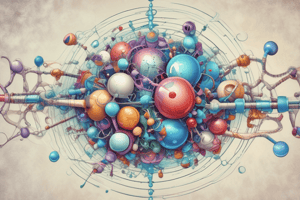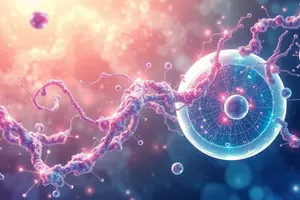Podcast
Questions and Answers
What does the term 'onset' refer to in pharmacodynamics?
What does the term 'onset' refer to in pharmacodynamics?
- The length of time a drug produces its desired effect.
- The point at which the activity of a drug is apparent. (correct)
- The measure of tightness with which a drug binds to a receptor.
- The time it takes for a drug to reach its maximum response.
What is meant by 'potency' of a drug?
What is meant by 'potency' of a drug?
- The amount of drug required to produce a defined effect. (correct)
- The time it takes to achieve maximum therapeutic effect.
- The tightness of the drug's binding to its receptor.
- The ability of a drug to induce a therapeutic response.
What is the role of a drug receptor in pharmacodynamics?
What is the role of a drug receptor in pharmacodynamics?
- It mediates the drug response through binding. (correct)
- It prevents drugs from having any biological response.
- It increases the duration of the therapeutic effect.
- It alters the chemical structure of the drug.
What is an antagonist in the context of drug action?
What is an antagonist in the context of drug action?
The term 'ligand' refers to which of the following?
The term 'ligand' refers to which of the following?
What is the concept of synergism in drug interactions?
What is the concept of synergism in drug interactions?
Which of the following describes potentiation?
Which of the following describes potentiation?
The term ED50 refers to what?
The term ED50 refers to what?
Which of the following accurately describes drug tolerance?
Which of the following accurately describes drug tolerance?
What characterizes antagonism in drug interactions?
What characterizes antagonism in drug interactions?
Flashcards are hidden until you start studying
Study Notes
Pharmacodynamics
- The study of how drugs affect the body.
- Focuses on concepts of potency, efficacy, and the therapeutic window.
Onset, Peak, and Duration of Drug Action
- Onset: The point where a drug's effect becomes apparent.
- Time elapsed between administration and the first sign of effect.
- Peak: The time when a drug reaches its maximum therapeutic response.
- Duration: The length of time a medication produces its desired effect.
- Example: Duration of oral acetaminophen is four to six hours.
Mechanism of Drug Action
- Describes how drugs produce effects in the body.
- Includes four main mechanisms:
- Drug-receptor interaction: Drugs bind to specific molecules (receptors) to trigger an effect.
- Ion channel modulation: Drugs can influence the opening or closing of channels that allow ions to pass through cell membranes.
- Enzyme activity: Drugs can either inhibit or activate enzymes involved in various biochemical processes.
- Carrier molecule interaction: Drugs can interfere with or facilitate the transport of substances across cell membranes.
Drug Receptors & Binding
- Drug receptors are usually proteins that bind drugs and mediate their effects.
- Binding of a drug to its receptor forms a drug-receptor complex (DR) which initiates the biological response.
Key Drug Characteristics
- Affinity: Measures how tightly a drug binds to its receptor.
- Efficacy: The drug's ability to induce a therapeutic response once bound to the receptor.
- Potency: The drug's strength, measured by the amount needed to produce a specific effect.
Ligand
- Any molecule that binds specifically to a particular receptor or site.
Drug Effects at Receptors
- Agonist: A drug that activates a receptor, producing a similar effect to the body's natural signaling molecules.
- Antagonist: A drug that blocks the action of an agonist at a receptor, without having any effect of its own.
Combined Drug Effects
- Addition: The combined response of two drugs equals the sum of their individual effects.
- Synergism: Two drugs with the same effect produce a greater response than the sum of their individual effects.
- Potentiation: A drug with no effect on its own enhances the effect of a second drug.
- Antagonism: One drug inhibits the effect of another drug.
Effective Dose 50 (ED50)
- The dose of drug required to produce a defined therapeutic response in 50% of the population.
- ED50 is often considered a standard starting dose for treatment.
Lethal Dose 50 (LD50)
- The dose of drug that is lethal to 50% of the treated animals.
Toxic Dose 50 (TD50)
- The dose of drug that causes adverse effects in 50% of subjects treated, at an intensity or frequency incompatible with the targeted indication.
Drug Effects
- Side Effects: Unavoidable, unintended pharmacodynamic effects occurring at a therapeutic dose.
- Toxic Effects: Result from excessive drug action due to overdosing or prolonged use.
- Drug Intolerance: Side effects of a drug in an individual at therapeutic doses.
- Drug Tolerance: Decreased response to a specific dose of drug after repeated administration.
Tolerance
- Patients who are tolerant to a drug require higher doses to achieve the same effects that could be achieved with lower doses previously.
- There are three types of tolerance:
- Pharmacodynamic tolerance: Occurs when the body adapts to the drug's effect at the receptor level.
- Pharmacokinetic (metabolic) tolerance: Occurs when the body metabolizes the drug more quickly, reducing its effective serum concentration.
- Tachyphylaxis: A rapid decrease in response after repeated drug administration, often within a short period.
Studying That Suits You
Use AI to generate personalized quizzes and flashcards to suit your learning preferences.




